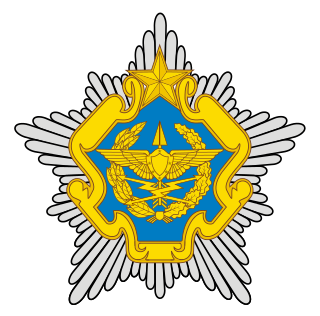 W
WThe Armed Forces of the Republic of Belarus consist of the Ground Forces and the Air and Air Defence Forces, all under the command of the Republic of Belarus Ministry of Defence. Being a landlocked country, Belarus has no navy.
 W
WThe Air Force and Air Defence Forces of the Republic of Belarus is the air force of the Armed Forces of Belarus, formed in 1992 from the 26th Air Army of the Soviet Air Forces which had been serving in the Byelorussian SSR.
 W
WThe Belarusian Ground Forces is a service branch of the Armed Forces of Belarus. It is considered to be the seniormost and notable service branch in the armed forces. The current commander-in-chief of the ground forces is Major General Alexander Nikitin.
 W
WThe Belarusian People's Republic (BPR), or Belarusian National Republic (BNR), historically referred to as the White Ruthenian Democratic Republic, was a failed attempt to create a Belarusian state on the territory controlled by the German Imperial Army during World War I. The BNR existed from 1918 to 1919.
 W
WThe Belarusian Transport Troops, also known as the Belorussian Mobile Forces as is the service branch of the Armed Forces of Belarus. It is responsible for the movement of personnel and material by truck, rail, and air, and is designed to carry the tasks of the transport support of the military formations from other service branches across the country.
 W
WBorder Guards Day, also known as Frontier Guards Day is a former Soviet holiday that celebrates the Border guard services of Russia and former Soviet republics. It is currently observed in Russia, Belarus, Kyrgyzstan, Tajikistan, Kazakhstan and Moldova on 28 May - the day of the anniversary of the formation of the Soviet Border Troops in 1918.
 W
WThe Collective Security Treaty Organization is an intergovernmental military alliance that was signed on 15 May 1992. In 1992, six post-Soviet states belonging to the Commonwealth of Independent States—Russia, Armenia, Kazakhstan, Kyrgyzstan, Tajikistan, and Uzbekistan—signed the Collective Security Treaty. Three other post-Soviet states—Azerbaijan, Belarus, and Georgia—signed the next year and the treaty took effect in 1994. Five years later, six of the nine—all but Azerbaijan, Georgia, and Uzbekistan—agreed to renew the treaty for five more years, and in 2002 those six agreed to create the Collective Security Treaty Organization as a military alliance.
 W
WDay of Tankmen is a professional military holiday in Russia and the former Soviet Union, celebrated every second Sunday of September. It celebrates the service and sacrifices of tank crews and commanders in armored formations since the Russian Civil War, when tanks were first used in Russian territory.
 W
WDefender of the Fatherland Day ; Kazakh: Отан қорғаушы күні; Tajik: Рӯзи Дорандаи Ватан; Kyrgyz: Мекенди коргоочулардын күнү; Belarusian: Дзень абаронцы Айчыны) is a holiday observed in Russia, Turkmenistan, Belarus, Kyrgyzstan, Kazakhstan and Tajikistan. It is celebrated on 23 February, except in Kazakhstan, where it is celebrated on 7 May.
 W
WHantsavichy Radar Station is a 70M6 Volga-type radar near Hantsavichy. It is an early warning radar, which is run by the Russian Space Forces. It is designed to identify launches of ballistic missiles from western Europe and can also track some artificial satellites, partly replacing the demolished radar station at Skrunda in Latvia.
 W
WThe Military Band Service of the Armed Forces of the Republic of Belarus is the central military band service of the Armed Forces of Belarus. The band was formed on 1 April 1950 as the Band of the Belorussian Military District. It was expanded into a service in the 1990s after the Independence of Belarus occurred. Its bands participate in military parades, military tattoos, and official ceremonies of Belarus. They perform domestically, regularly performing in the Central Officers House in Minsk, as well as other garrison clubs. The massed bands of the Minsk Garrison is an annual participant in the parades of the Minsk Garrison on Victors Avenue since 2004. The repertoire of the band includes more than 500 compositions of the most important classical music composers and contemporary ones. Bands have performed in festivals in Great Britain, Ireland, Germany, France, Poland, Sweden, and Russia. The band has also played in the Spasskaya Tower military tattoo in 2013, 2016, and 2017. The band is commanded by its Senior Director of Music/Chief Conductor, Lieutenant Colonel Igor Khlebus, since 2019. The artistic director of the band is Colonel Evgueny Dovzhik.
 W
WA military identity card is an identity document issued to soldiers of the armed forces of various countries.
 W
WA Military Unit Number is a numeric alternate designation for military units in the armed forces and internal troops of post-Soviet states, originally used by those of the Soviet Union.
 W
WMinistry of Internal Affairs of Belarus, abbreviated as МUS in the Belarusian language and MVD in the Russian language, is a body of the Belarusian Government that is charged with the internal affairs of Belarus. Day to day law enforcement is carried out by the Militsiya. The Ministry is also tasked with providing security to state buildings and officials. Organizations such as the Presidential Guard are under the control of the Ministry. The clearing of landmines is among the tasks of the ministry.
 W
WAirborne Forces Day also known as Paratroopers' Day is a professional military holiday in Russia and other countries, celebrated on 2 August annually. It is the official holiday of the former Soviet Airborne forces.
 W
WThe Security Council of Belarus is an interdepartmental body with a mandate to ensure the security of the Republic of Belarus. It considers internal and external affairs of the state with regard to the interest of maintaining security and defense. The Council was established upon the adoption of Resolution +1249 on 15 November 1991. The current Secretary of the Council is Valery Vakulchik.
 W
WThe Special Forces of Belarus also known as the Spetsnaz of Belarus is a service branch of the Armed Forces of Belarus. Like all post-Soviet states, Belarus inherited its special forces (Spetsnaz) units from the remnants of the Soviet armed forces, GRU and KGB units. Belarus's units conduct joint exercises with the Armed Forces of Russia in which the nation's special forces participate extensively. Belarus's ruling party has been accused of using its special forces to assassinate opposition leaders.
 W
WThe State Border Committee of the Republic of Belarus, GPK manages the international borders of Belarus. Its armed paramilitary force is known as the Border Guard Service, It carries out committee orders and policy. The service covers the borders with Russia, Ukraine, Poland, Lithuania and Latvia.